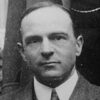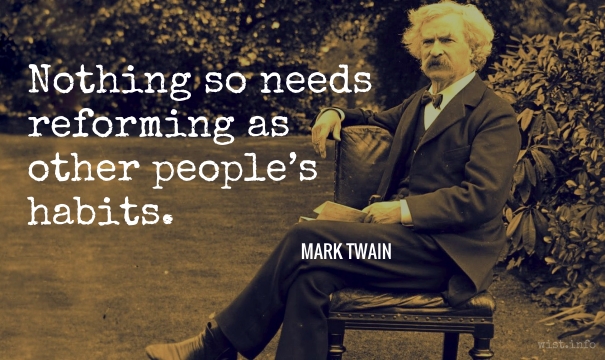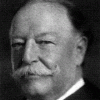The seeds of evil usually germinated in the footprints of people who knew how everybody else ought to behave and felt the need to tell them so.
Quotations about:
busy-body
Note not all quotations have been tagged, so Search may find additional quotes on this topic.
It is the people with secret attractions to various temptations who busy themselves most with removing those temptations from other people; really they are defending themselves under the pretext of defending others, because at heart they fear their own weakness.
Ernest Jones (1879-1958) Welsh neurologist and psychoanalyst
“Criticisms of Psycho-Analytic Treatment,” Speech, Chicago Neurological and Chicago Medical Societies (18 Jan 1911)
Originally published in the American Journal of the Medical Sciences (Jul 1911). Reprinted in Papers on Psycho-Analysis, ch. 12 (1918).
Advice iz a drug in the market; the supply alwus exceeds the demand.
[Advice is a drag on the market; the supply always exceeds the demand.]
Josh Billings (1818-1885) American humorist, aphorist [pseud. of Henry Wheeler Shaw]
Everybody’s Friend, Or; Josh Billing’s Encyclopedia and Proverbial Philosophy of Wit and Humor, “Lobstir Sallad” (1874)
(Source)
The kind of man who wants the government to adopt and enforce his ideas is always the kind of man whose ideas are idiotic.
H. L. Mencken (1880-1956) American writer and journalist [Henry Lewis Mencken]
Minority Report, #323 (1956)
(Source)
Every man hath in his own life sins enough, in his own mind trouble enough, in his own fortune evils enough, and in performance of his offices failings more than enough, to entertain his own inquiry; so that curiosity after the affairs of others cannot be without envy, and an evil mind. What is it to me, if my neighbour’s grandfather were a Syrian, or his grandmother illegitimate; or that another is indebted five thousand pounds, or whether his wife be expensive?
One who is too nice an observer of the business of others, like one who is too curious in observing the labor of bees, will often be stung for his curiosity.
No tendency is quite so strong in human nature as the desire to lay down rules of conduct for other people.
The sole end for which mankind are warranted, individually or collectively, in interfering with the liberty of action of any of their number, is self-protection. That the only purpose for which power can be rightfully exercised over any member of a civilised community, against his will, is to prevent harm to others. His own good, either physical or moral, is not a sufficient warrant. He cannot rightfully be compelled to do or forbear because it will be better for him to do so, because it will make him happier, because, in the opinions of others, to do so would be wise, or even right. These are good reasons for remonstrating with him, or reasoning with him, or persuading him, or entreating him, but not for compelling him, or visiting him with any evil in case he do otherwise. To justify that, the conduct from which it is desired to deter him must be calculated to produce evil to some one else. The only part of the conduct of any one, for which he is amenable to society, is that which concerns others. In the part which merely concerns himself, his independence is, of right, absolute. Over himself, over his own body and mind, the individual is sovereign.
The first thing that happens to men once they have had to give up any pleasure, whether for propriety’s sake, or from satiety, or for their health, is to condemn it in other people. Such behavior implies a sort of attachment to the very things one has just renounced: we want nobody else to enjoy the good things that we have lost; it is a feeling of jealousy.
[La première chose qui arrive aux hommes après avoir renoncé aux plaisirs, ou par bienséance, ou par lassitude, ou par régime, c’est de les condamner dans les autres. Il entre dans cette conduite une sorte d’attachement pour les choses mêmes que l’on vient de quitter; l’on aimerait qu’un bien qui n’est plus pour nous ne fût plus aussi pour le reste du monde: c’est un sentiment de jalousie.]
Jean de La Bruyère (1645-1696) French essayist, moralist
The Characters [Les Caractères], ch. 11 “Of Mankind [De l’Homme],” § 112 (11.112) (1688) [tr. Stewart (1970)]
(Source)
(Source (French)). Alternate translations:
The first thing men do, when they have renounc'd pleasure, either out of decency, surfeit, or conviction, is to condemn it in others. This sort of management is however seldom free from a particular affection for those very things they left off, but they would have no body enjoy the pleasure they can no longer enjoy themselves, which proceeds more from Jealousie than any thing else.
[Bullord ed. (1696)]
The first thing Men do, when they have renounc'd Pleasure, either out of Decency, Surfeit, or Conviction, is to condemn it in others. They preserve, in this Conduct, a sort of Affection for the very things they left off; they would have no body enjoy the Pleasure they can no longer enjoy themselves: 'Tis a sentiment of Jealousy.
[Curll ed. (1713)]
The first Thing, when Men have renounced Pleasure, either out of Decency, Satiety, or Necessity, is to condemn it in others. This Sort of Reproof, however, is not free from a latent Affection for their forsaken Pleasures; they would interdict to all others what they can themselves no longer enjoy; their Admonitions are the Snarlings of Jealousy, not the Dictates of Purity.
[Browne ed. (1752)]
The first thing men do when they have renounced pleasure, through decency, lassitude, or for the sake of health, is to condemn it in others. Such conduct denotes a kind of latent affection for the very things they left off; they would like no one to enjoy a pleasure they can no longer indulge in; and thus they show their feelings of jealousy.
[tr. Van Laun (1885)]
ABSTAINER, n. A weak person who yields to the temptation of denying himself a pleasure. A Total Abstainer is one who abstains from everything, but abstention, and especially from inactivity in the affairs of others.
If we would all ov us take kare ov our own souls, and let our nabors alone, thare would be less time lost, and more souls saved.
[If we would all of us take care of our own souls, and let our neighbors alone, there would be less time lost and more souls saved.]
Of all tyrannies a tyranny sincerely exercised for the good of its victims may be the most oppressive. It may be better to live under robber barons than under omnipotent moral busybodies, The robber baron’s cruelty may sometimes sleep, his cupidity may at some point be satiated; but those who torment us for own good will torment us without end, for they do so with the approval of their own conscience. They may be more likely to go to Heaven yet at the same time likelier to make a Hell of earth.


















